Can You Freeze Brussels Sprouts?
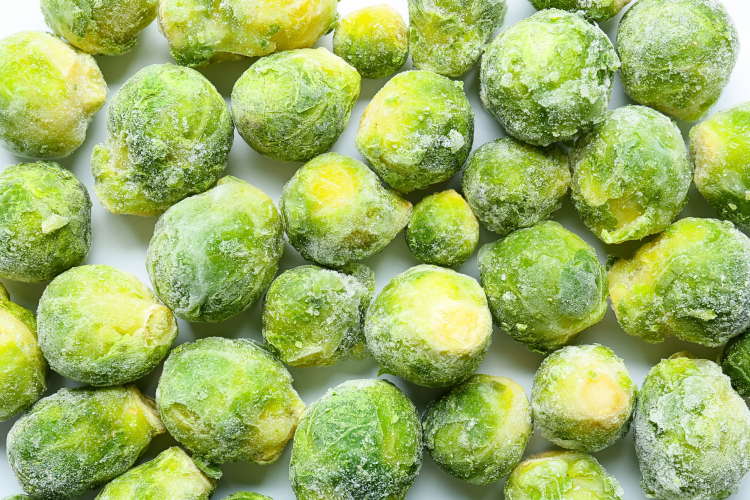
Have you ever had an abundance of them and wondered, "Can You Freeze Brussels sprouts?" These peculiar-looking vegetables are nutritious and versatile, but what if you bought too many or harvested more than you can use immediately? Can you freeze Brussels sprouts to preserve them for future use?
Freezing Brussels sprouts may be an excellent way to extend their shelf life while retaining their nutritional value, but is it possible? It's a great question as the freezing process might affect the texture or flavor of these mini cabbages. Let’s dive into everything you need to know.
Jump to Section
- Can Brussels Sprouts Be Frozen?
- How To Freeze Brussels Sprouts
- How To Cook Frozen Brussels Sprouts
- Are Frozen Brussels Sprouts Healthy?
Can Brussels Sprouts Be Frozen?
It's finally time to discover the answer to "Can you freeze Brussels sprouts?" Yes, you can. Freezing Brussels sprouts is a common practice to preserve their freshness and nutritional content. However, doing so can affect their texture and flavor. Frozen Brussels sprouts tend to be softer than fresh ones once thawed and may have a slightly different taste.
This is why it’s crucial to follow the right steps to maintain as much of their original quality as possible. Proper preparation, such as blanching the sprouts before freezing, can help retain their color, flavor and nutritional value. By doing so, you can enjoy Brussels sprouts that are closer in quality to their fresh counterparts, even after months in the freezer.
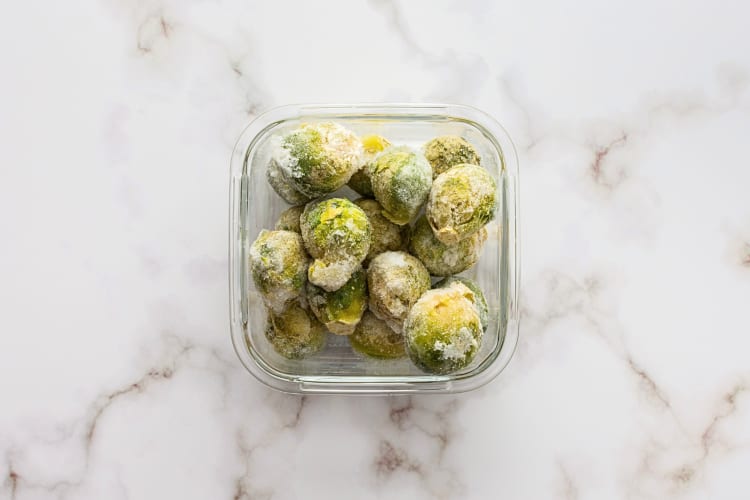
Can You Freeze Fresh Brussels Sprouts?
A follow-up question to the main topic would be — can you freeze fresh Brussels sprouts? The answer is yes, you can freeze Brussels sprouts when they’re freshly picked from your garden or recently purchased from the store.
Fresh Brussels sprouts should be cleaned, trimmed and preferably blanched before freezing to lock in their flavor, color and nutrients. This process helps prevent the vegetables from becoming mushy when you finally use them. Keep reading to learn how to blanch your Brussels sprouts.
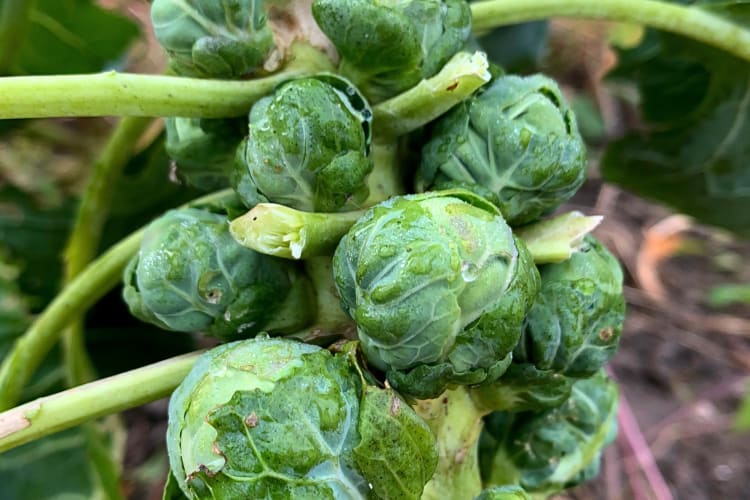
Can You Freeze Cooked Brussels Sprouts?
Can you freeze Brussels sprouts after cooking them? Yes, you can certainly do so. As you might have guessed, it's a convenient option if you've prepared too many and want to save some for later. Simply cool them completely, transfer them to airtight containers and store them in the freezer. When you're ready to enjoy them, just reheat, serve and enjoy.
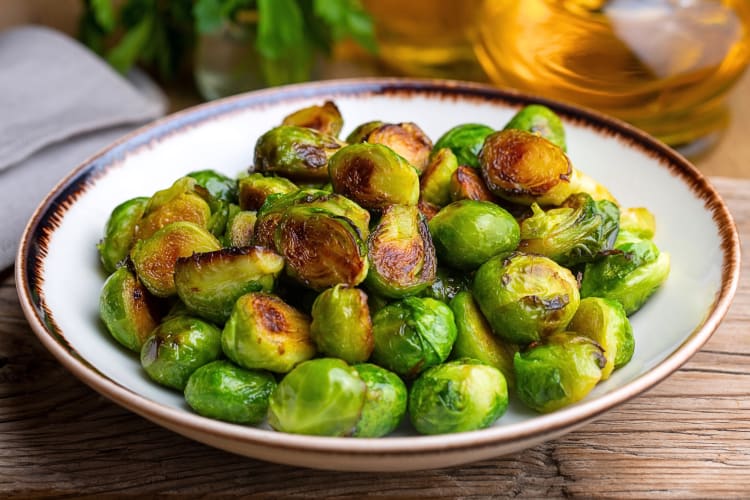
Can You Freeze Raw Brussels Sprouts?
Now that we've looked at the cooked versions, can you freeze raw Brussels sprouts? You can freeze Brussels Sprouts when they’re raw, but it’s generally not recommended unless you're in a rush. Raw Brussels sprouts can develop an off taste and a mushy texture when thawed. Blanching them before freezing is a better approach to preserve their quality.
Doing so will help to lock in their color, flavor and texture, ensuring they maintain their best qualities even after being frozen. If you do choose to freeze them raw, be aware that the results may not be as desirable, with the sprouts potentially becoming watery or less flavorful.
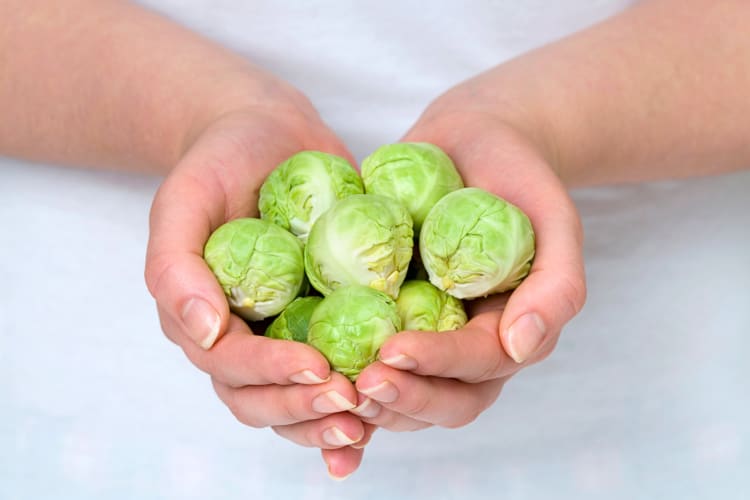
Can You Freeze Roasted Brussels Sprouts?
We alluded to the cooked versions above, but can you freeze Brussels sprouts after roasting them? Yes, and once again, freezing Brussels sprouts after roasting allows you to save time on future meals. Just make sure they are fully cooled before packing them into freezer-safe containers.
When reheating, it’s best to use the oven to restore some of their crispiness. This method of using frozen Brussels sprouts can help you preserve their rich, caramelized flavors and slightly crisp texture.
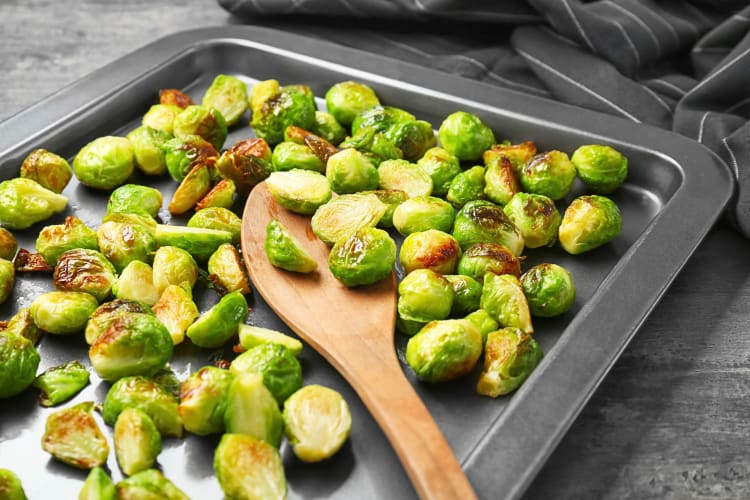
How To Freeze Brussels Sprouts
By now you should be well-versed and ready to answer the question "Can you freeze Brussels sprouts?" However, knowing how to do it correctly is essential to ensure the best results. Follow the instructions below to prepare and freeze Brussels sprouts successfully:
-
Clean and Trim: Wash the Brussels sprouts thoroughly under cold water. Remove any yellow or damaged leaves and trim the stem ends. Cleaning and trimming are crucial to eliminate any dirt or pests and ensure that only the freshest parts of the sprouts are preserved.
-
Blanch: Blanching is an essential step (see below) to preserve color and texture. This process helps maintain the vibrant green color of the Brussels sprouts and prevents them from becoming overly soft or discolored during freezing.
-
Cool Quickly: After blanching, immediately transfer the sprouts into ice water to stop the cooking process. Cooling quickly is vital to halt the cooking, ensuring the sprouts don’t become mushy and retain a firm texture.
-
Dry: Drain and pat the sprouts dry to prevent freezer burn. Removing excess moisture reduces the risk of ice crystals forming on the sprouts, which can affect their texture and taste.
-
Pack: Place the sprouts on a baking sheet in such a way that they can be frozen individually. Once frozen, transfer them to airtight containers or freezer bags. This method prevents the sprouts from sticking together, allowing you to take out only what you need.
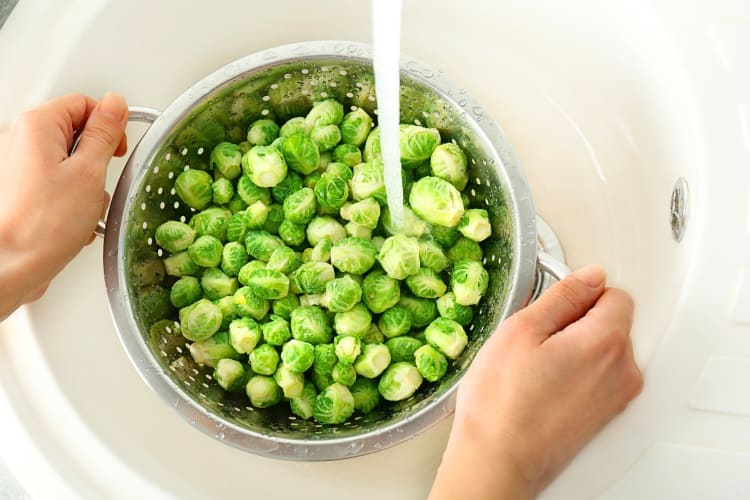
How To Blanch Brussels Sprouts for Freezing
It's best to freeze Brussels sprouts after blanching them for best results. Blanching involves boiling the Brussels sprouts briefly before plunging them into ice water. Here’s how to do it:
-
Boil Water: Bring a large pot of water to a rolling boil. The amount of water should be sufficient to cover the Brussels sprouts completely to ensure even blanching.
-
Prepare Ice Bath: Fill a large bowl with ice and cold water. This ice bath is essential to quickly stop the cooking process, preserving the sprouts' texture and color.
-
Blanch: Add the Brussels sprouts to the boiling water. Blanch small sprouts for three minutes, medium ones for four minutes and large ones for five minutes. This precise timing ensures the sprouts are cooked just enough to deactivate enzymes without becoming overcooked.
-
Ice Bath: Immediately transfer the sprouts to the ice bath to stop the cooking process. This step locks in the freshness and prevents further cooking from residual heat.
-
Drain and Dry: Once cooled, drain the sprouts and pat them dry with a towel. Proper drying is key to avoiding excess moisture, which can lead to freezer burn.
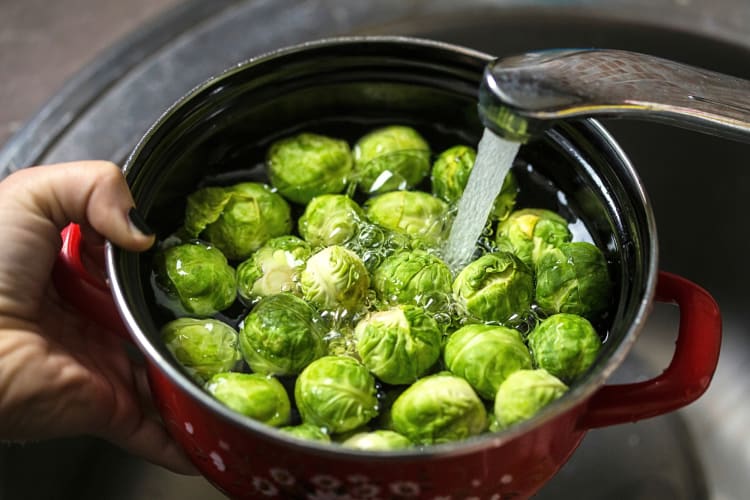
Can You Freeze Fresh Brussels Sprouts Without Blanching Them?
Can you freeze Brussels sprouts that are fresh, without going through the blanching process? While this is possible, it’s not recommended. Blanching helps retain their color, texture and nutritional value. If you skip this step, you may end up with sprouts that are mushy and less flavorful after thawing. Blanching also helps to eliminate surface bacteria and enzymes that could otherwise degrade the quality of the sprouts over time.
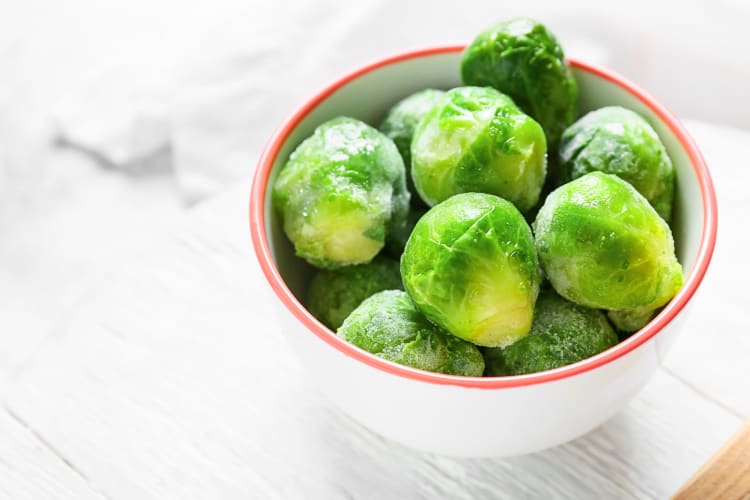
How Long Can You Freeze Brussels Sprouts For?
Now that you know all the steps involved, you might be wondering, "How long can you freeze Brussels sprouts for?" When properly prepared, they can be stored in the freezer for up to 12 months. Cooked Brussels sprouts should be used within three to four months for quality purposes. Be sure to label your containers with the dates when freezing Brussels sprouts to keep track of storage times.
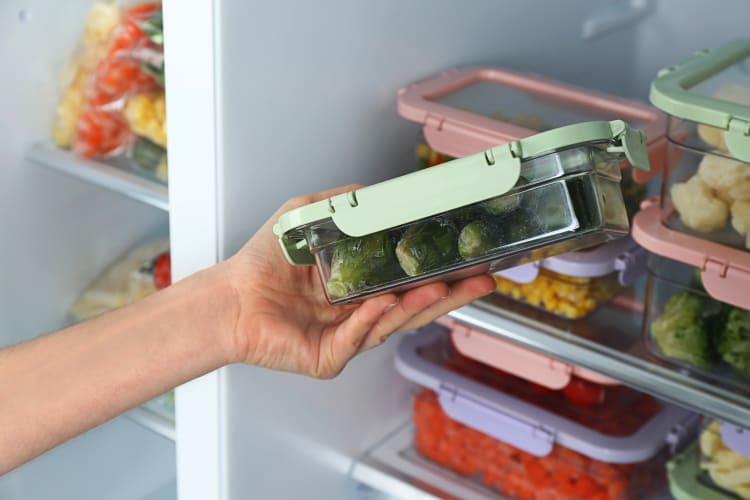
How To Cook Frozen Brussels Sprouts
Cooking frozen Brussels sprouts is easy and convenient. You can freeze Brussels sprouts before roasting, sautéing or even adding them directly to dishes like stir-fries and soups, without defrosting them. Here are some useful tips:
-
Sauté: Cook frozen sprouts in a hot pan with butter or oil until they are caramelized and heated through.
-
Steam: Steaming is a gentle method that preserves their nutritional value. Steam frozen sprouts for five to seven minutes or until tender.
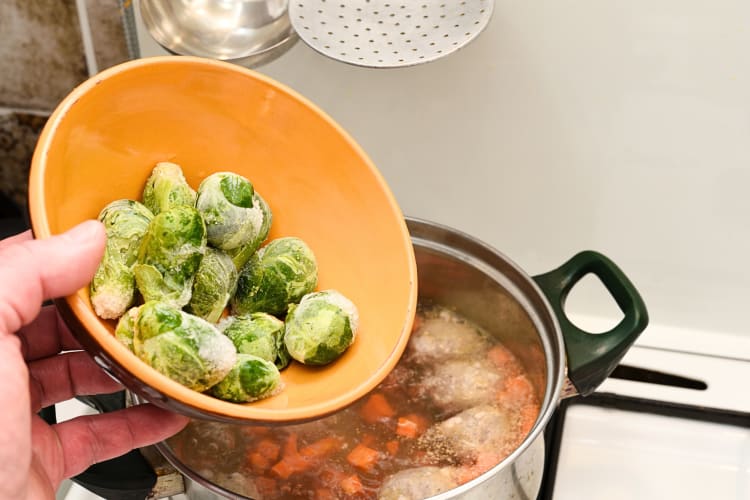
Can You Roast Frozen Brussels Sprouts?
Roasting frozen Brussels sprouts is a great way to bring out their natural sweetness, as seen in recipes such as maple bacon Brussels sprouts. You can roast frozen Brussels sprouts by following these four steps:
-
Preheat your oven to 400°F.
-
Toss the frozen Brussels sprouts with olive oil, salt and pepper.
-
Spread them out on a baking sheet in a single layer.
-
Roast for 25-30 minutes, stirring halfway through to ensure even cooking.
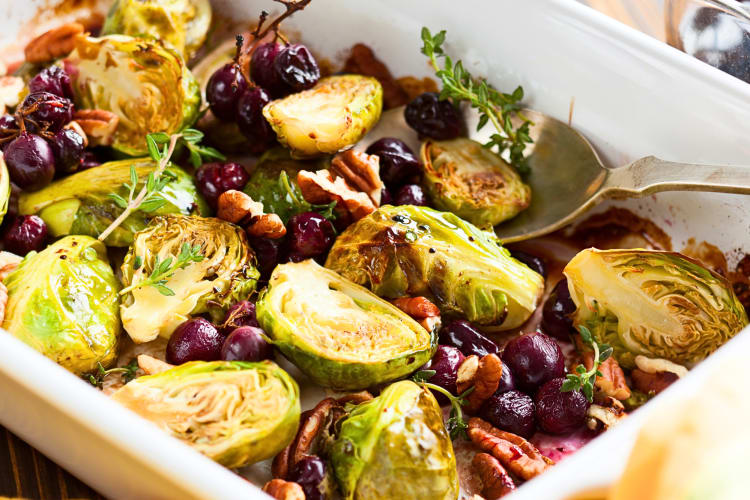
How To Defrost Brussels Sprouts
Now that you know you can freeze Brussels sprouts, you may be wondering how best to defrost them. These are the best methods:
-
Overnight in the Fridge: Place frozen Brussels sprouts in the refrigerator to thaw slowly overnight.
-
Microwave: Use the defrost setting on your microwave, but be careful not to overheat and cook them.
-
Direct Cooking: In many recipes, such as sautéed Brussels sprouts or Brussels sprouts and bacon, you can add them directly from the freezer without defrosting.
All of the above cooking and defrosting methods, including some extra tips and tricks, are taught by renowned, experienced chefs at cooking classes near you and online. Learn even more about the versatility of these delicious vegetables, or some of your other favorite foods if you'd prefer, while sharpening your culinary skills in a fun, immersive experience.
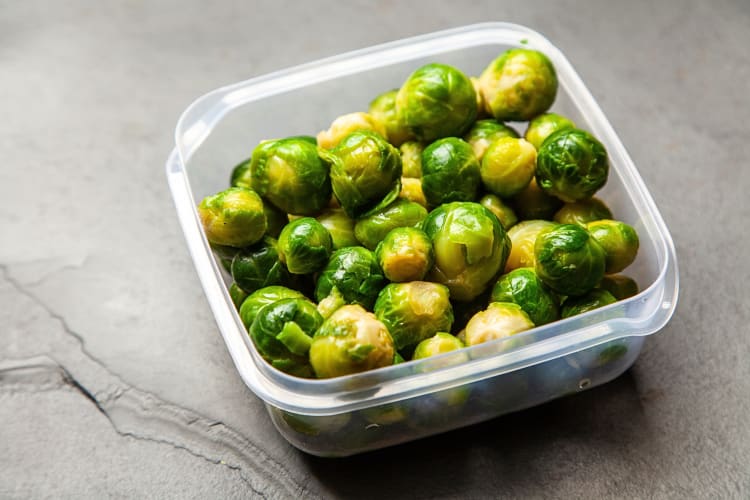
Are Frozen Brussels Sprouts Healthy?
Yes, you can freeze Brussels sprouts whilst retaining most of their nutritional value, even months after freezing, making them a great addition to your diet. These vegetables are naturally high in fiber, which supports digestive health, as well as vitamins C and K, which are essential for immune function and bone health.
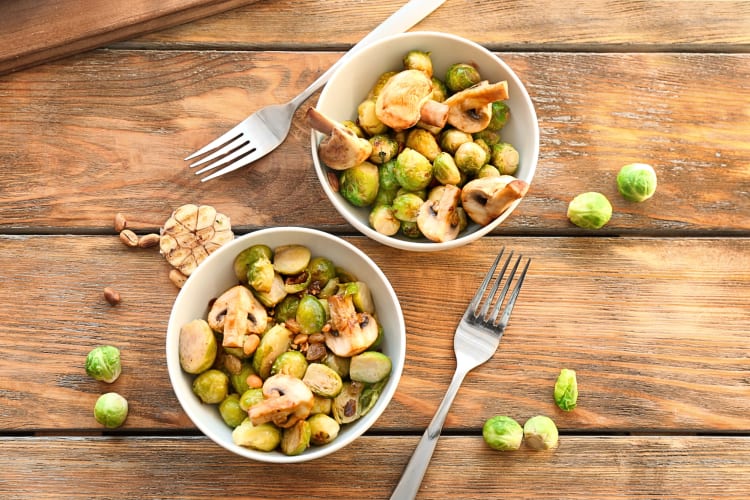
Now that you know you can freeze Brussels sprouts, you can conveniently and easily incorporate these nutrient-rich vegetables into your meals regularly. Whether you're growing your own and hoping to avoid wasting some of your harvest, or have simply bought too many from your local grocery store, it's reassuring to know that you can freeze Brussels sprouts and save these nutritious greens for later use.
For even more ways to explore your favorite foods, check out other experiences happening on Cozymeal.
